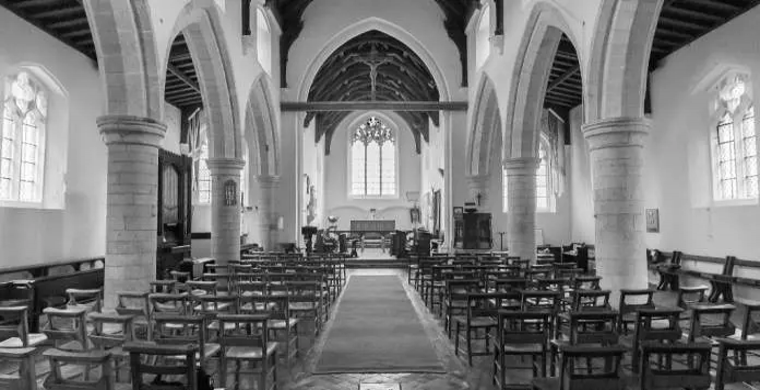The biggest church demolition job since Henry VIII
By Peter Mullen
https://www.conservativewoman.co.uk/the-biggest-church-demolition-job-since-henry-viii/
October 22, 2021
THE Church of England's closing-down sale is proving a terrific success, and so it is to be extended indefinitely. They have even officially appointed someone to be in charge of it and given her a title: Wendy Matthews, Head of Pastoral and Closed Churches. You think I'm making this up, don't you? Well, I'm not -- unfortunately. Check for yourself in the Church Commissioners' own very weighty report Church of England Mission in Revision.
The Commissioners manage the Church's investments, and they have indicated that as many as 368 church buildings might be closed in the next two to five years. This information comes from a diocesan survey which asked for estimates on the number of closures a diocese might bring forward. It found that 12 dioceses were considering up to five closures, nine were planning between six and 12 closures, and five expected up to 40 within five years.
According to the Commissioners: 'There are concerns that increasing financial and demographic pressures might make it likely that more closures will be necessary.'
Why? The Commissioners blame a decline in church attendance, a shortage of clergy and the impact of the pandemic.
There are 16,000 Anglican churches in the UK. Even before the coronavirus crisis an average of 20-25 were being shut down every year.
Alas, this is not quick enough for the Commissioners and their colleagues in the limitless and all-powerful bureaucracy of the Council of Bishops and the General Synod. So Church of England Mission in Revision will speed the demolition by reducing consultations, appeals and the input from heritage bodies.
In plain speech, this means that the wishes of parishioners will be overruled. Again, this is not my invention. The Commissioners are explicit to the point of bluntness: 'What is needed are faster processes which would allow for an increase in closures over time to be managed in a sensible way.'
It all depends on what you mean by sensible, doesn't it?
The National Churches Trust (NCT), which seeks to preserve our parish churches, insists the consultation process is vital. Its spokesman Eddie Tulasiewicz said: 'Consultation is really important because we're talking about what is truly a national asset, the Church of England's church buildings. They're there for everybody, not just members of the Church of England, but for the community as well.'
Of course! And that is how the Church of England has been understood for the last four centuries. It is not a sect for enthusiasts with their own agenda, fads and fancies. It is a national treasure. As the 16th century Anglican divine Richard Hooker wrote in his celebrated Laws of Ecclesiastical Polity: 'Every man of England a member of the Church of England.' That meant freedom to attend church or stay away and the right to baptism, holy matrimony and a decent burial.
Mr Tulasiewicz cautioned: 'Before a church is deemed that it no longer has a future, careful consideration needs to be given as to how resources are spent, the problems a church is facing and its community and heritage contributions.
'Consultation really should be thorough and shouldn't be rushed. I think we've got to look at church buildings as being a huge asset. Once they're closed, they're closed for good.'
The NCT is to set up a national consultation next month to gather public opinion on the importance and relevance of church buildings in the UK.
May I urge you to participate, please?
The Commissioners say there is a shortage of money, despite the fact that 'the quota' or 'the parish share' -- mandatory contributions from every parish -- is relentlessly increased year by year. The real problem is not a shortage of money but of what the money hard-pressed parishioners put on to the collecting plate week by week is being spent on. This is a vast bureaucratic collective. As I described in an article here last week, every diocese in the country has spawned a gross and unwieldy bureaucracy.
For example, does the Diocese of London really need seven bishops and four archdeacons, each supported by a large staff? A similar profligacy is replicated throughout all 42 dioceses. Proportionally, the Church employs an army of pen-pushers to match the NHS -- equality and diversity gauleiters and others with equally preposterous job titles. In the near future, there will be far fewer parish churches and a dearth of priests to preach and teach, to administer the sacraments and to provide pastoral care. But there will be no shortage of bureaucrats.
All this is not some unfortunate accident which has befallen the local parishes, their faithful, hands-on clergy and their long-suffering parishioners. It is deliberate policy set out in the Archbishop of York's scheme Simpler Humbler Bolder -- aka Cottrell's Wheeze -- of which Church of England Mission in Revision is just one part.
I am not encouraged when I discover that Cottrell is the man in charge of 'Vision and Strategy'. This is the plan according to which our ancient and beloved parochial structure is to be permitted to wither away and replaced by a nationwide labyrinth of secularised ecclesiastical wokery.
This amounts to the biggest demolition job since Henry VIII sent in his bulldozers.














